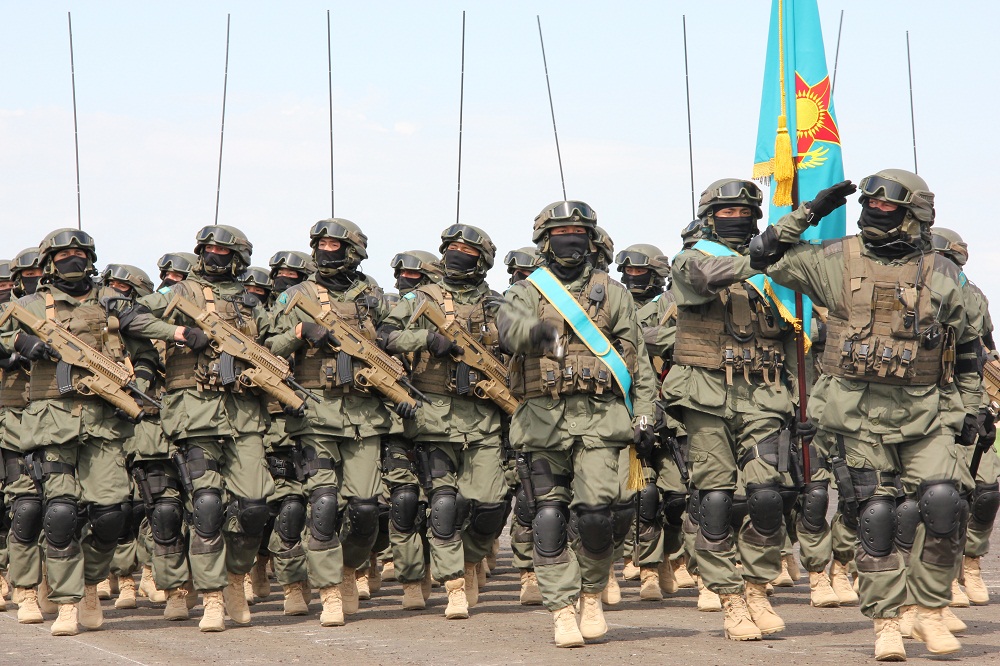Wrong horse

Kazakhstan’s troops
Written by Alexander Khamchikhin; Originally appeared at VPK, translated by Comrade Korolyov exclusively for SouthFront; Edited by Yoana
Analysis of the current condition of Post-Soviet countries’ Armed Forces (excluding Russia) allows us to conclude, that they don’t have a bright future ahead of them. Some of these countries can perish together with their armies.
Currently, Kazakhstan and Azerbaijan have the best armed forces among the others. This is due to the fact that by exporting natural resources, these countries have enough money to acquire new modern technology in more or less satisfactory numbers, and their main arms supplier is, of course, the Russian Federation. However they also purchase weapons from Israel and from the West. Astana and Baku have their own military industry, despite being small, it is developing. They also have (and this is very important) enough cadres to supply their needs in trained combat personal and professionals (and to man the industry itself). The April “microwar” in Karabakh confirmed that Azerbaijan’s military might have increased. Although, currently decreasing oil and gas prices could seriously harm the military ambitions of his small country.
Ukraine and Belarus both have very developed military industry, lots of already existing technology and vehicles, and enough qualified cadres. But their military prospective is much worse, because their economy situation is close to catastrophic. This makes it impossible to renew their vast, but outdated Soviet-inherited arsenals.
In Ukraine the situation is much worse, because Kiev’s regime is aiming to finish off the country with total theft of everything that is not bolted to the floor. Due to this fact, talking about the existence of military industry and especially about the Ukrainian military won’t be relevant. Belarussian situation is not as dramatic, but trying to combine “socialist experiments” in the economy while still practicing “multivectoral external policy” (as per Minsk’s official statement) can lead this country into great troubles in the future.
Armenia – is a sort of Caucasian Israel. The country has virtually no resources. It is surrounded by horrible geopolitical conditions, but pours a lot of resources into the military industry. Because of mostly economic reasons, Russia cannot back Armenia in the way the US backs Israel. Whatever some citizens of this brotherly nation think about this, there is no alternative for support from Russia. Their geopolitical ally and Georgia was the prime example of this. Tbilisi, immediately after USSR’s collapse, was betting on a “different horse” and

Image: Andrey Sedih
now they cannot change their extremely pro-western policy, even if they wanted to. They cannot change it despite the fact that this policy cost them 20% of their territory with no hope of return. Moreover, it didn’t bring any economic benefits to the country. Armenia has massive problems with its resources, technology, cadres and military industry as well.
Uzbekistan and Turkmenia, with their main income coming natural resource export, could have been in the same place as Kazakhstan and Azerbaijan, but immense corruption, absence of their own military industry and extreme lack of qualified personal stand in their way. This is why it is very hard for them to build their militaries, even within the boundaries of their own region.
Discussing the military futures of the Baltic States, Moldavia, Kyrgyzstan and Tajikistan is pointless. Their armies will remain as they are now – depressingly small.
The rule of Kosovo
Many of the former Soviet republics still hope that either Russia or the West will build a military for them. As experience shows, this is an illusion. The new tech will be available to the “younger brothers” only for a full price, and most post-Soviet states simply cannot afford that, and many – don’t have the necessary qualified personal. The Cold War-era technology is still available for cheap purchase, maybe Russia (or even the capitalist West) could agree to give it away even for free, but other former Soviet states already have lots of it. Even if they get it for free, things like BMP-1 or Mi-24B (or M113 or F-16A) are hopelessly out of date. This is why talking about Western military assistance to Ukraine is pointless – Kiev is too broke to afford modern technology, but has plenty of stuff from the 70s-80s of its own.
Apart from the “legal” countries, post-Soviet space has two partially-recognized (Abkhazia and South Ossetia) and two unrecognized (Transnistria and Karabakh) states as well as Crimea. The only possible conflict that might be solved peacefully is the Transnistrian one. The two possible options are creating a confederate-type state, or the refusal of their claims on Tiraspol by Kishenyov side. The other conflicts are impossible to be settled peacefully due to the fact that both of the sides are absolutely unwilling to yield or change their position. Even a theoretical resolution of these conflicts by diplomacy has now been destroyed after Kosovo. Kosovan incident creators, i.e. NATO, demand for it to be viewed as a “unique circumstance”, even though there is nothing special about this. The uniqueness is simply summed up in the famous quote: ”Quod licet Jovi, non licet bovi” (“What is allowed for Jupiter is forbidden for the bull”). This is why the named conflicts will be resolved by military means, by someone’s capitulation, or the whole situation will be frozen (for example, Gibraltar or Falklands have been frozen for centuries). For Crimea and former Georgian autonomous regions it is likely that the conflict will be frozen. Karabakh probably guaranteed itself another war. Even though Azerbaijan’s military grew is considerably stronger, Karabakh is too tough nut for them.
Chairs from older brothers
As it goes for relations of post-Soviet countries with Russia, we need to review the history of USSR’s collapse. The other republics were not trying to get some abstract independence, but independence specifically from the Russian rule. However, only in the Baltic States (and to a lesser extend – Moldavia and Caucausus region) this point was shared by some of the people of those republics, other republics suffered a rebellion of the elites, the striving of local Republican Committees of CPSU secretaries to becoming presidents. This is why, in all post-Soviet countries “independence from Russia” was artificially planted into their base ideology of local Communist Parties. Ukraine went as far as to reach clinical russophobia. Other countries didn’t embrace this idea, but it certainly influenced their perception of intra-Soviet issues. The minds of about 90% of Crimeans can be called extremely pro-Russian. This region will be the most loyal to Moscow for decades to come just because Crimeans, unlike all the other post-Soviet citizens have something to compare in between. However, after 22 years of living under Kiev’s rule, their mentality has already changed from the Russian mentality. With Belarussians and Kazakhs, the Russians speak the same language (both literally and spiritually), however after talking to them you quickly understand that they are already foreigners. From other former compatriots the Russians have drifted away even further.
The events of the last 8 years show that an alliance with Russia guarantees a country protection in case of some sort of problems, and an alliance with NATO – absence of such protection, military defeat and possibly territorial losses. However, these facts contradict with the common-place ideology of independence from Russia. This is why even ODKB leaders try to sit on two or even three chairs at once (a Chinese chair has quietly and politely appeared in the last few decades). This is why we can’t have any sort of illusions of integration on the post-Soviet space. The prospective is rather limited, we can’t count on anything being changed any time soon.
However, it is in the military that the integration can be most successful. The growing global might and influence of the Russian Armed Forces (together with their readiness) cannot be ignored anymore. If a post-Soviet country needs guaranty of its security, that post-Soviet country can rely solely on Russia, not on NATO’s soap bubble. However, in the best case scenario Russia will be supported militarily by the 5 ODKB members, 2 of which are solely “consumers of security”. With the other countries of former USSR Russia will most likely have a “cold peace” or a “cold war” in the closest decades. Trying to wage a war against Russia will be purely suicidal for anyone on the post-Soviet space.



